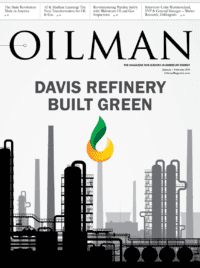The oil and gas industry has seen an influx of technological developments in recent years which have significantly impacted the way oil companies operate and how the industry is viewed as a whole. Once looked upon as traditional and stagnant, the oil and gas industry is increasingly taking more modern approaches to how processes are performed. From revamping how oil is explored to implementing smart safety practices, the oil industry has seen many positive changes.
Nowadays, energy companies are developing and integrating accounting and financial software into their initiatives to better manage their profitability and better understand the value of their assets. Tulsa-based Waterfield Energy is a prime example of a company that has developed a financial software platform to enhance their clients’ operations. Pete Waldroop, the Chief Executive Officer (CEO) of Waterfield Energy provided his insight on accounting and financial software and what it means for the oil and gas industry overall.
Having over 27 years of experience in software, consulting, and the energy business, Waldroop was asked why accounting and financial software is important to have and what is its significance to the energy industry. Waldroop expressed how the industry is a highly complex business that involves thousands of owners within a single well and because of that, there is great potential for errors and significant financial penalties. “Energy accounting software should do a few key things: empower users, alleviate risk, and strengthen the bottom line. That hasn’t been the industry’s experience for a while and the gaps for improvements were glaring,” said Waldroop.
When asked what made Waterfield Energy decide to invest in and develop energy software, Waldroop said, “There was an opportunity in the space to create new software and technology to tackle complex problems in the industry. The other companies in this space weren’t doing it. Just because something has always been done a certain way doesn’t mean it should be done that way.” Waldroop also expressed how much technology has evolved across the energy industry, but not in the area of energy accounting software, until now. “We saw how slow processing speeds still are 30+ years after most of our competitors delivered first versions of their software and said there’s room for improvement,” said Waldroop.
Waldroop was also asked to share the types of software and technological innovations Waterfield Energy has created to improve energy operations and how it has benefited or will benefit clients and consumers. He stated, “A common complaint in our industry is that it’s very difficult to access the data that led to certain calculations. To combat this, we created WE Calculation Trace. WE Calculation trace walks you through how the system derived settlement values, eliminating the need to spend a lot of cycles researching how the value was derived.” Waldroop went on to express how other solutions often depend on teams of people to support royalty calls. He explained how the number of individuals needed are drastically reduced with their solution.
Waldroop also shared details on another innovation Waterfield Energy has established. “We’re really excited about our WE Asset builder which is a graphical representation of product movement from the wellhead to the delivery point(s) (i.e., processing plant or into a transmission line). The “oos and ahs” heard when industry professionals get to see these technology advancements just show how starved the industry was for software to catch up to today’s standards,” said Waldroop. He described how their users run processes 150 times faster than the next leading energy software competitor and how traditionally, a user would start a process to run for eight hours overnight. “Now they can run that same process in about 3 minutes,” said Waldroop.
When asked to describe any improvements he’s witnessed in the oil industry over the past decade since the integration of accounting and financial software, Waldroop stated, “Energy accounting software has been around for decades but because it hadn’t evolved during that time, the younger software workforce – developers, engineers, implementers, etc. – were seeking careers in other industries. Thankfully, at Waterfield we’ve had a different experience because we’re saying to the younger workforce: If you want a chance to innovate and create the latest and greatest in software, we want you on our team.” Waldroop went on to state how empowering the workforce has given them (Waterfield Energy) the opportunity to create better software. “As a result, we’ve created a modern software product with a user interface that’s comparable to the technologies we use in our everyday lives.” said Waldroop.
When asked to share what software he’s most excited for consumers to use, Waldroop stated, “We are really excited about our fully-integrated Upstream ERP solution. We’ve built this package completely from scratch – including new solutions for financial accounting, revenue accounting, cost accounting, land management and GIS. We partnered with leading energy companies to create the next generation product, and it is amazing.”
Waterfield Energy, like other energy companies, is continuously innovating, but as Waldroop expressed, they are “just getting started on bringing the best in energy accounting software to the market.” When asked what other developments he’d like to see happen in the oil and gas industry, Waldroop said, “It would be great to see the industry be less reactive to price sensitivity and more proactive to price planning. A lot happens in this industry that’s out of our control, and it’s that reason that the industry needs to keep producing technology that minimizes the impact of those external factors.”
Tonae’ Hamilton has been a contributor and associate editor to the magazine for two years. She has been writing professionally for almost four years. In her free time, Tonae’ likes to spend time with her three pets, cook, and binge-watch Netflix shows. Tonae' has a Bachelor of Arts in Communication from McDaniel College.











